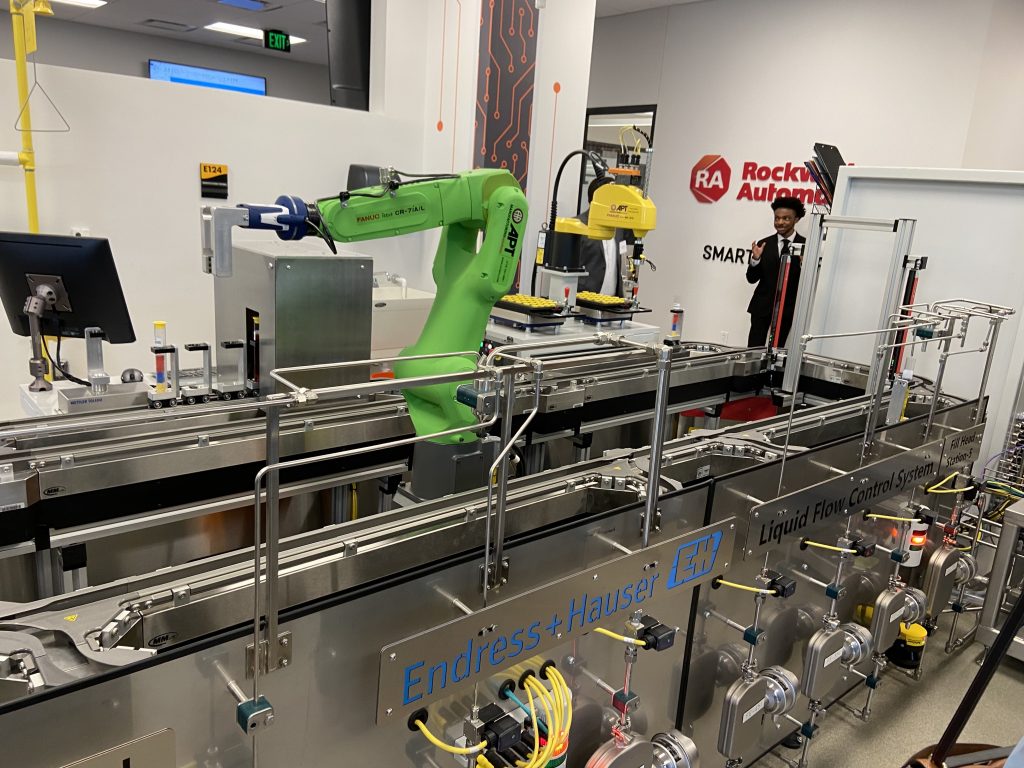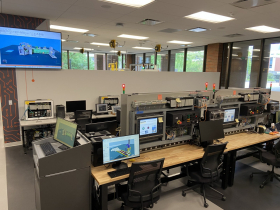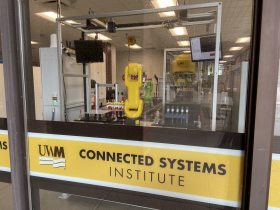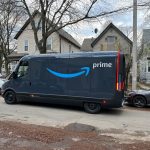Microsoft, UWM Unveil New AI Lab
Lab aims to connect Wisconsin manufacturers with new automation technologies.

Microsoft AI Co-Innovation Lab at UW-Milwaukee. Photo taken June 26, 2025 by Graham Kilmer.
UW-Milwaukee’s Golda Meir Library houses a lab dedicated to shaping the future of manufacturing in Wisconsin and, potentially, the world.
Microsoft officially opened a new AI Co-Innovation Lab Wednesday. It’s one of only five in the world and will use Microsoft artificial intelligence technologies to automate manufacturing and industrial processes. The lab is part of the tech company’s investment in the region, which includes a $3.3 billion data center under construction in Racine County.
The $3 million lab at UW-Milwaukee brings together the university’s Connected Systems Institute and Titletown Tech, a Green Bay-based venture capital firm founded by Microsoft and the Green Bay Packers. The lab has already started working with Wisconsin firms to develop AI-based automation prototypes that can be scaled up to perform tasks that are currently labor-intensive.
UW-Milwaukee Chancellor Mark Mone said the new lab represents the future of education, demonstrating how the university can have “influence” and “impact” around the world.
“We have technology to advance and grow jobs, grow the economy, but we need the talent and we need the research that’s going to continue to create that cutting edge knowledge to truly advance manufacturing in a globally competitive way,” Mone said. “We can’t do it alone, we recognize that, and that’s the strength of these partnerships.”
The goal of the lab is to accelerate AI adoption in manufacturing. Microsoft’s involvement ensures that its AI technologies are integrated into manufacturing businesses across the state, The company will work with those in the lab on automation prototypes.
Those involved in creating the new lab see AI technology reshaping the global economy. Craig Dickman, managing partner of Titletown Tech, said it already is: “We’re either going to lead or we’re going to follow.”
The lab will “upskill” companies that don’t have the resources to begin developing or adopting AI tools on their own, said Julianna Javor, director of the AI Co-Innovation Lab. The lab is building “for tomorrow,” she said.
Based on some of the prototypes the lab has already created, future manufacturing could need fewer employees or reassign employees to entirely different tasks.
Renaissant, a software-as-a-service automation company focused on the transportation and shipping industry, recently collaborated with the lab to develop an AI-agent prototype that will replace clerks managing and directing trucks arriving at shipping yards with an automated AI agent.
“So an AI agent works much faster and much more elegantly than people, and it doesn’t require training and ongoing training,” said Renaissant CEO Tom Dean.
His firm works with the largest shipping, logistics and supply-chain management companies. The company’s transportation yards handle thousands of trucks a day, representing tens of thousands of shipping clerks that may eventually be replaced by Renaissant’s AI-agent prototype.
The technology is also creating new, advanced industrial jobs for workers managing the new AI tools. Regal Rexnord was among the early firms to work with the lab on an AI prototype. Their system allows for “remote condition monitoring” of the industrial machines the company manufactures.
“We manufacture power transmission equipment, motors, bearings, gear boxes, and those things fail,” said Robert Federer, vice president and general manager for Regal Rexnord. The AI prototype “predicts and prescribes” maintenance solutions to prevent machine failures. Engineers will be able to sit in a remote office and monitor machines across dozens of different plants.
“And really that replaces a lot of labor in the plant,” Federer said. “Today they do route based maintenance, where they walk around and they try to manually sense through handheld vibration sensors and what have you, and that’s just very labor intensive.”
Dale Kooyenga, president and CEO of the Metropolitan Milwaukee Association of Commerce, told Urban Milwaukee that the possibilities of AI seem “limitless” and will allow firms to manufacture advanced products more efficiently. It will mean fewer jobs, but the days of competing with other countries on cheap labor are over, he said.
“If we’re going to stay relevant, we’re going to stay competitive; there has to be an infusion of information technology throughout the entire manufacturing process,” he said. “So there’ll be no part of the manufacturing process that AI is not part of.”
WEDC, which partnered in the creation of the lab, is working to create a pipeline of “small and medium manufacturers” that will have access to the new technologies at the lab, said Missy Hughes, Wisconsin Economic Development Corporation secretary and CEO. Rima Alaily, corporate vice president and general counsel for infrastructure legal affairs at Microsoft, said the firm has committed to working with 270 companies across Wisconsin.
“Today’s competition is not just about price or access, it’s about infrastructure, and infrastructure is the foundation on which innovation is built,” Alaily said. “And today, Wisconsin is building.”
Photos
If you think stories like this are important, become a member of Urban Milwaukee and help support real, independent journalism. Plus you get some cool added benefits.
























…and the current budget plans of the legislature to cut $86 million from the budget of the universities … this is going to dissuade Microsoft and likely others to invest in a state that doesn’t value research and almost certain to cause valuable university profs and researchers to leave and seek greener pastures. Doncha think??? Where is the sense of these continued cuts?